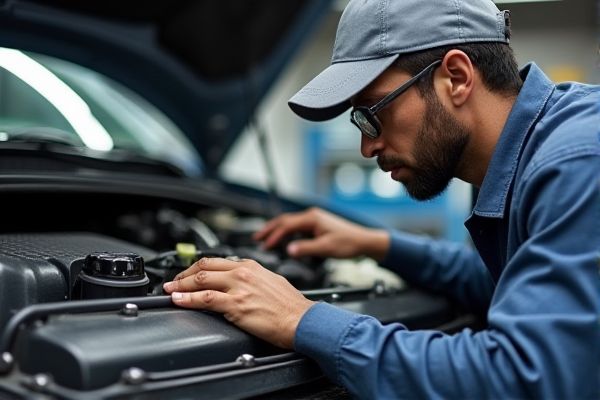
The demand for skilled auto mechanics in Nigeria is on the rise due to the increasing number of vehicles and the need for maintenance services. Various automotive repair shops, dealerships, and service centers are actively seeking trained professionals to handle diagnostics, repairs, and vehicle servicing. Many job opportunities are available in urban areas, particularly in Lagos, Abuja, and Port Harcourt, where the automotive market is thriving. Training programs and vocational schools also provide certifications, enhancing job prospects for aspiring mechanics in the competitive automotive industry.
Job Description
An auto mechanic in Nigeria is responsible for diagnosing, repairing, and maintaining various vehicle types, including cars, trucks, and motorcycles. This role involves conducting routine inspections, troubleshooting electrical and mechanical issues, and ensuring vehicles meet safety standards. You will work with diagnostic tools and equipment to assess problems accurately and advise customers on necessary repairs and maintenance services. Strong communication skills and a thorough understanding of automotive technology are essential for success in this field, considering the growing demand for reliable transportation in Nigeria.
Requirement
Becoming an auto mechanic in Nigeria typically requires a strong foundation of technical skills and knowledge about vehicle systems. Many employers prefer candidates who have completed a vocational or technical training program, often lasting one to three years, where hands-on experience is emphasized. Certifications from recognized automotive associations can enhance your job prospects and demonstrate your competency in vehicle repair and maintenance. A good understanding of customer service is also essential, as mechanics often interact directly with clients to diagnose issues and provide solutions.
Salary and Perks Expected
In Nigeria, the salary for an auto mechanic can range from approximately 50,000 to 150,000 Naira per month, depending on experience, location, and specialization. Many mechanics benefit from additional perks, such as health insurance, performance bonuses, and opportunities for overtime pay. Your earning potential may increase with certifications in advanced automotive technologies or specialized training in areas like electronics or diesel mechanics. Many employers value hands-on experience, which can also lead to promotions to supervisory or managerial positions over time.
Similar Job Names
- Automotive Technician
- Auto Mechanic
- Vehicle Service Technician
- Diesel Mechanic
- Electrical Systems Technician
- Brake Technician
- Engine Repair Specialist
- Transmission Technician
- Auto Body Repair Technician
- Fleet Maintenance Technician
- Tire Technician
- Automotive Service Manager
- Diagnostic Technician
- Lubrication Technician
- Automotive Parts Specialist
Job Expectation Concept
The job expectations for auto mechanics in Nigeria include a strong foundation in vehicle maintenance and repair, requiring familiarity with both local and imported vehicle models. Proficiency in troubleshooting mechanical and electrical issues is essential, alongside the capability to use diagnostic tools effectively. Mechanic training programs often emphasize hands-on experience and may include internships to build practical skills. With the increasing number of vehicles on Nigerian roads, there is a growing demand for skilled auto mechanics who can deliver quality service and build lasting relationships with clients.
Career Advantage and Weakness
The auto mechanic profession in Nigeria offers significant career advantages, including a growing demand for skilled technicians due to the increasing number of vehicles on the roads. Opportunities for self-employment and entrepreneurship abound, allowing you to establish your own workshop or business. However, competition can be fierce, and many mechanics may struggle with obtaining formal training or certification, which can limit job prospects. Economic fluctuations and a reliance on imported auto parts can also create challenges, affecting your potential earnings and job stability.
Important Thing Must Know
The auto mechanic job in Nigeria requires a strong understanding of vehicle systems and diagnostic techniques. Skilled mechanics can expect to work with various types of vehicles, from personal cars to commercial trucks, necessitating a broad knowledge base. Technical training is essential, with many mechanics benefiting from formal education and hands-on experience, which can be obtained through vocational schools or apprenticeships. The demand for qualified auto mechanics is significant, driven by the growing number of vehicles on Nigerian roads and the increasing complexity of automotive technology. Emphasizing customer service alongside technical skills can enhance your reputation and lead to a successful career in this field.
Alternative Career Options
In Nigeria, auto mechanics can explore various alternative career options that capitalize on their technical skills and knowledge of vehicles. Opportunities include automotive sales, where individuals can advise customers on vehicles and parts, or roles in automotive technology, focusing on the development and maintenance of cutting-edge machinery. Another option is working in logistics and transportation management, overseeing vehicle fleets and ensuring efficient operations. Venturing into vocational training and education also allows you to share your expertise by teaching aspiring mechanics and promoting industry best practices.
Companies List
- Toyota Nigeria Limited
- Innoson Vehicle Manufacturing Company
- Stallion Group
- Honda Manufacturing Nigeria
- Peugeot Automobile Nigeria
- Nissan Nigeria Limited
- Coscharis Motors
- Elizade Group
- VON Automobiles Nigeria
- Nigerian National Petroleum Corporation (NNPC)
List of Ideal City
Lagos, Nigeria's bustling metropolis, offers numerous auto mechanic job opportunities due to its high population density and diverse automotive market. Port Harcourt, known for its oil industry, also presents a steady demand for auto repair services as vehicles are essential for transportation in this region. Kano, with its growing economy, has seen a rise in vehicle ownership, leading to an increased need for skilled mechanics. Abuja, the capital city, provides a unique mix of government and private sector vehicles that require regular maintenance and repair, creating a stable job market for mechanics.
 jobs-nigeria.com
jobs-nigeria.com